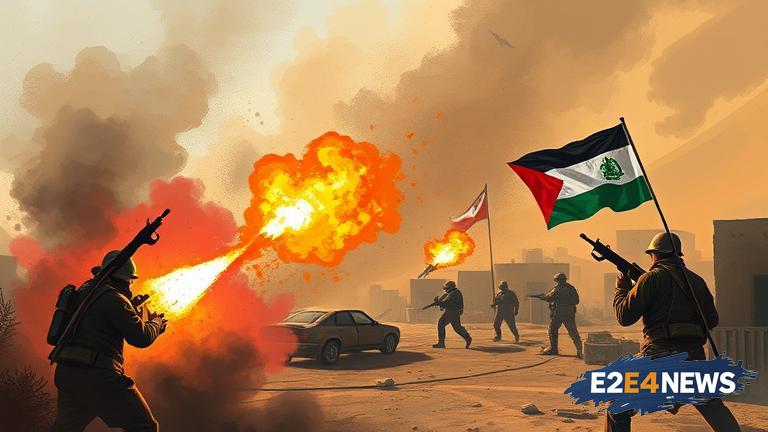The Gaza Strip, a coastal region with a population of approximately 2 million people, has been embroiled in a longstanding conflict between Israel and Hamas, a Palestinian Islamist organization. The latest escalation of violence began on August 26, 2025, with a series of airstrikes and rocket attacks exchanged between the two sides. The Israeli military has launched a campaign to target Hamas militants and infrastructure, while Hamas has responded with rocket fire into Israeli territory. The conflict has resulted in significant damage to infrastructure, including homes, schools, and hospitals, and has displaced thousands of civilians. The international community has expressed deep concern over the escalating violence, with the United Nations and European Union calling for an immediate ceasefire. The United States has also weighed in, urging both sides to exercise restraint and return to the negotiating table. Despite these efforts, the conflict shows no signs of abating, with both Israel and Hamas dug in and refusing to back down. The humanitarian situation in the Gaza Strip is dire, with food, water, and medical supplies in short supply. The conflict has also had a significant impact on the regional economy, with trade and commerce severely disrupted. The Israeli government has faced criticism for its handling of the conflict, with some accusing it of using disproportionate force and violating international law. Hamas, meanwhile, has been accused of using civilians as human shields and launching indiscriminate attacks on Israeli civilians. The conflict has also sparked protests and demonstrations around the world, with many calling for an end to the violence and a lasting resolution to the Israeli-Palestinian conflict. The Gaza Strip has been under Israeli blockade since 2007, which has had a devastating impact on the local economy and living standards. The blockade has restricted the flow of goods and people into and out of the territory, leading to widespread poverty and unemployment. The conflict has also had a significant impact on the mental health of civilians, with many suffering from anxiety, depression, and post-traumatic stress disorder. The international community has pledged to provide humanitarian aid to those affected by the conflict, but the delivery of aid has been hindered by the ongoing violence. The conflict has also raised concerns about the potential for further escalation, with some warning of a wider regional conflict. The Israeli military has mobilized troops along the Gaza border, and there are fears of a potential ground invasion. The conflict has also sparked a diplomatic row between Israel and Turkey, with the Turkish government accusing Israel of committing war crimes. The European Union has called for an emergency meeting to discuss the conflict, and the United Nations Security Council is set to hold an emergency session to address the crisis. As the conflict continues to escalate, there are fears of a long and bloody war, with significant humanitarian and geopolitical consequences. The international community is urging both sides to return to the negotiating table and work towards a lasting resolution to the conflict. The Gaza Strip is one of the most densely populated places on earth, and the conflict has had a devastating impact on civilians. The conflict has also raised questions about the role of social media in perpetuating violence and hatred, with many calling for greater regulation of online platforms. The Israeli government has faced criticism for its use of social media to disseminate propaganda and disinformation, while Hamas has used social media to promote its ideology and recruit supporters. As the conflict continues to unfold, it is clear that a lasting resolution will require a comprehensive and inclusive approach, addressing the underlying issues and grievances of both sides.
